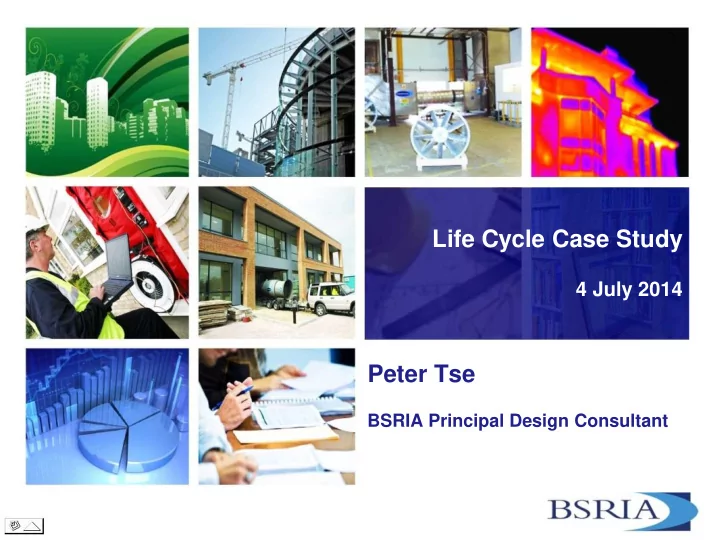

Life Cycle Case Study 4 July 2014 Peter Tse BSRIA Principal Design Consultant
UEA Enterprise Centre • Gateway to the University, showcase of sustainability • Construction cost: £16m • Teaching and learning facilities with work spaces for local companies 2 2 The built environment experts
Exemplar low carbon building • • 100 Year Design Life Very Low Embodied Energy • • Passivhaus Certification Focus on Local Supply Chains • • Breeam Outstanding High Use of Renewable Materials 3 3 The built environment experts
Focus on natural local materials 4 4 The built environment experts
Life Cycle Costing Initial drivers for project: • Breeam Outstanding • Part of Reality Checking process in Soft Landings Making better decisions: LCC LCA 5 Making buildings better
What did we review? • Aligned with Breeam 2011 • Credit 1 – LCC analysis for project at conceptual design (Stage C/D) • Credit 2 – LCC analysis for selected building components or systems • Credit 3 – Revisit analyses at detailed design (Stage D/E) – Vital that recommendations are implemented 6 Making buildings better
What data did we need? Client team inputted actual figures into the model for: – Management costs – Maintenance costs – Utility costs Contractor inputted actual figures into the model for: – Capital costs 7 Making buildings better
Credit 1 Passivhaus vs Part L design 60-year LCC breakdown 60-year cumulative year-by-year at public sector discount rate estimated spend (3% inflation) 700 600 500 400 300 200 100 0 PassivHaus Part L compliant Inner Pie – Passivhaus Capital investment Outer Pie – Part L design Operation & Maintenance 8 Making buildings better
Credit 2 – Alternative designs within PassivHaus scheme Energy for At least two of the heating following areas be Roof Floor reviewed: and PV finish system • Envelope • Services Passivhaus • Finishes design • External spaces Internal Window lighting frames External hard land- scaping 9 Making buildings better
What did we find? 1. Window frames 140% 120% 100% 80% 60% 40% 20% 140% 0% 120% Aluminium faced All wood 100% Requires 80% painting 60% 40% 20% 0% Aluminium faced All wood 10 Making buildings better
What did we find? 2. External hard landscaping 140% 120% 100% 80% 60% 40% 20% 0% Stone + timber Gravel + timber Gravel Stone 11 Making buildings better
What did we find? 3. Internal floor finish 300% 250% 200% 150% 100% 50% 0% Carpet wood lino Hardwood only Carpet only 12 Making buildings better
Other factors? 13 Making buildings better
Credit 3 400% 350% 300% 250% 200% 150% 100% 50% 0% Carpet wood lino Hardwood only Carpet only Polished concrete 14 Making buildings better
Has Life-cycle considerations benefitted the project? Positive • Enriched understanding of the project values - learnt about which issues were important to different client representatives • Helped to ensure ‘realistic’ value engineering • Client appreciation of life-cycle process • A very well informed project team • Making the right decision Negative • A lot of information to digest and a lot of scenarios to consider, when do you stop the analysis? • A multi-headed Client has appeared, who do we listen to? 15 Making buildings better
More than colour: Applying nanotechnologies for the multifunctional ceramic pigments development Produce multi-functional pigments for construction and automotive applications Pigment functionalities: Thermal storage, infra-red reflectance, antibacterial and self cleaning 16 Making buildings better
Traditional vs Nanopigmy Validate the economic and environmental costs and benefits of each pigment in relation to traditional solutions 2. Thermal storage + self-cleaning in concrete render 1. Thermal storage + antibacterial in paint 3. Infra red reflectance + self cleaning in and polymer board concrete render 17 Making buildings better
Applying Life-cycle thinking • Life cycle costing and life cycle assessment allow the effects of a material or product innovation to be considered in advance • Can indicate where innovations have most impact • Can help avoid costly mistakes • Close liaison with supplier/manufacturer is needed to obtain robust data 18 Making buildings better
Thank you Peter Tse peter.tse@bsria.co.uk Tel: +44 (0) 1344 465651| Mob: +44 (0) 7957 473856 19 Making buildings better
Recommend
More recommend